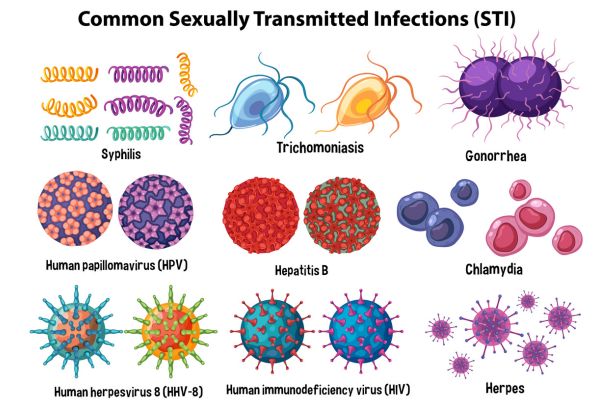
Can You Sue Someone for Giving You an STD? (Sexually Transmitted Disease)
Few situations are as emotionally painful and legally complex as discovering that someone gave you a sexually transmitted disease (STD). Beyond the physical toll, the betrayal of trust can leave long-lasting emotional scars. With millions of new STD cases reported each year in the United States, one pressing question arises:
Can you sue someone for giving you an STD?
The short answer is yes—but it depends on what the other person knew, what they did (or didn’t do), and the laws in your state. Let’s explore how the law protects you and what legal steps you can take to seek justice.
STD vs. STI: What’s the Legal Difference?
The terms sexually transmitted disease (STD) and sexually transmitted infection (STI) are often used interchangeably, but there’s a subtle difference.
- STI refers to the infection itself—the presence of a virus, bacteria, or parasite.
- STD describes when that infection causes symptoms or illness.
From a legal standpoint, the difference doesn’t change your rights. Whether your partner transmitted HIV, herpes, or HPV, the issue centers on knowledge and disclosure, not the terminology.
When You Can Sue Someone for Giving You an STD
You may have grounds for a lawsuit if your partner knowingly or negligently exposed you to a sexually transmitted disease. Here are the main legal scenarios recognized by most U.S. courts:
1. Intentional Transmission
If your partner knew they had an STD and still engaged in sexual activity without informing you, it can be considered intentional harm.
This type of behavior may qualify as:
- Civil battery or assault
- Intentional infliction of emotional distress
- Criminal charges, such as reckless endangerment or sexual battery
Example: Someone diagnosed with HIV who has unprotected sex without disclosing their condition could face serious criminal penalties.
2. Negligent Transmission
Negligence means failing to act with reasonable care. Even if your partner didn’t intend to harm you, they can still be held liable if they should have known they were infected.
For example:
- Ignoring visible symptoms
- Failing to get tested despite exposure
- Assuming protection eliminates all risk
- Negligence cases are often civil lawsuits seeking financial compensation rather than criminal penalties.
3. Fraud or Deception
Lying about being “clean,” falsifying test results, or deliberately hiding a diagnosis constitutes fraudulent behavior.
In these cases, victims can sue for both financial damages and emotional suffering, since deceit removes the victim’s ability to give informed consent.
How to Prove Your Case
Winning an STD transmission case depends on evidence and intent. You must establish that your partner caused your infection and that they acted knowingly or negligently.
Here’s what helps build a strong case:
- Medical records showing your diagnosis and timeline
- Communication evidence (texts, messages, or emails showing disclosure or denial)
- Witness statements from friends, healthcare professionals, or prior partners
- Expert testimony to connect the transmission to the accused individual
Since proving who infected whom can be complex, lawyers often use a combination of medical testing timelines and documented communication to support the case.
Types of Lawsuits You Can File
1. Personal Injury Lawsuit
This is the most common approach. You claim that the defendant’s actions caused physical and emotional harm.
You may recover damages for:
- Medical bills and treatment costs
- Lost wages during recovery
- Ongoing medication or therapy expenses
- Pain, suffering, and emotional trauma
2. Civil Battery or Sexual Battery
If sexual contact occurred without informed consent, you may sue under sexual battery laws. Courts often treat failing to disclose an STD as a form of non-consensual act, especially in cases involving deception or coercion.
3. Emotional Distress Lawsuit
Even if physical symptoms are minimal, the psychological impact—anxiety, humiliation, depression—can be significant. Victims may seek damages for intentional or negligent infliction of emotional distress.
Possible Legal Defenses
Not every claim results in liability. Common defenses include:
- The accused did not know they were infected.
- The plaintiff was already infected or had multiple partners (causation issue).
- The plaintiff gave informed consent after being told of the infection.
- The statute of limitations for filing a lawsuit has expired.
These factors don’t automatically end a case, but they may affect your chances of success.
What Compensation Can You Seek?
If the court rules in your favor, you could receive different types of damages:
- Economic damages: reimbursement for hospital visits, testing, and long-term medication.
- Non-economic damages: compensation for pain, emotional trauma, and reduced quality of life.
- Punitive damages: additional amounts meant to punish the defendant for malicious or reckless behavior.
The more intentional the act, the higher the potential compensation.
How to Sue: Step-by-Step Process
- Consult an attorney experienced in personal injury or sexual battery law.
- Gather all evidence—medical records, communications, test results.
- File a formal complaint in civil court.
- Participate in the discovery phase, where both sides exchange evidence.
- Seek a settlement or proceed to trial if an agreement isn’t reached.
Most cases are settled privately to protect both parties’ privacy, but some proceed publicly depending on the severity of the offense.
State-Specific Laws: Legal Differences Across the U.S.
Laws regarding STD transmission vary by state.
- California: Knowingly exposing someone to HIV without disclosure is a felony.
- New York: Unprotected sex while knowingly infected is considered reckless endangerment.
- Georgia: Treats intentional transmission of HIV or other serious STDs as a criminal offense with possible imprisonment.
Because state laws differ, always consult a local attorney before taking legal action.
Is It Worth Suing?
Legal action won’t erase the emotional pain, but it can bring closure, accountability, and financial relief.
Consider suing if:
- The infection caused significant medical or emotional harm.
- The partner knowingly or deceptively infected you.
- You want to prevent the same harm from happening to others.
Even if you choose not to go to court, consulting an attorney helps you understand your options for negotiation or settlement.
Frequently Asked Questions (FAQs)
Can you go to jail for giving someone an STD?
Yes. If it’s proven that you knowingly transmitted an STD, certain states classify it as a misdemeanor or felony, carrying fines and possible jail time.
What if the person didn’t know they had an STD?
Without proof of knowledge or intent, a civil lawsuit for negligence may still apply, though criminal penalties are less likely.
Can you sue for emotional distress only?
Yes. Emotional trauma, humiliation, and anxiety resulting from an STD infection can be grounds for compensation.
How long do you have to file a lawsuit?
Most states allow one to three years from the date of discovery, but timelines vary. Consult a lawyer immediately after diagnosis.
Can the case settle privately?
Yes. Many STD-related cases end in confidential settlements, avoiding public court exposure.
Final Thoughts
If someone knowingly or negligently infected you with an STD, remember—you are not powerless. The law provides pathways to seek compensation, accountability, and justice.
Whether through a personal injury claim or a criminal complaint, holding the responsible person accountable protects both your health and your dignity.
Your first step should be simple but crucial: talk to an experienced attorney who understands these sensitive cases. Justice and health go hand in hand—don’t hesitate to protect both.



